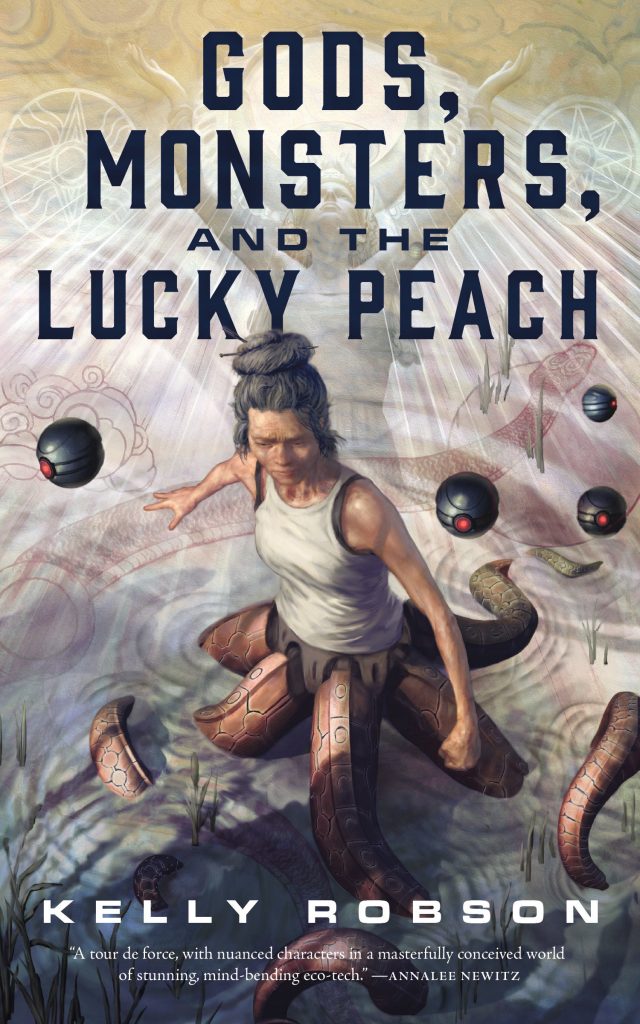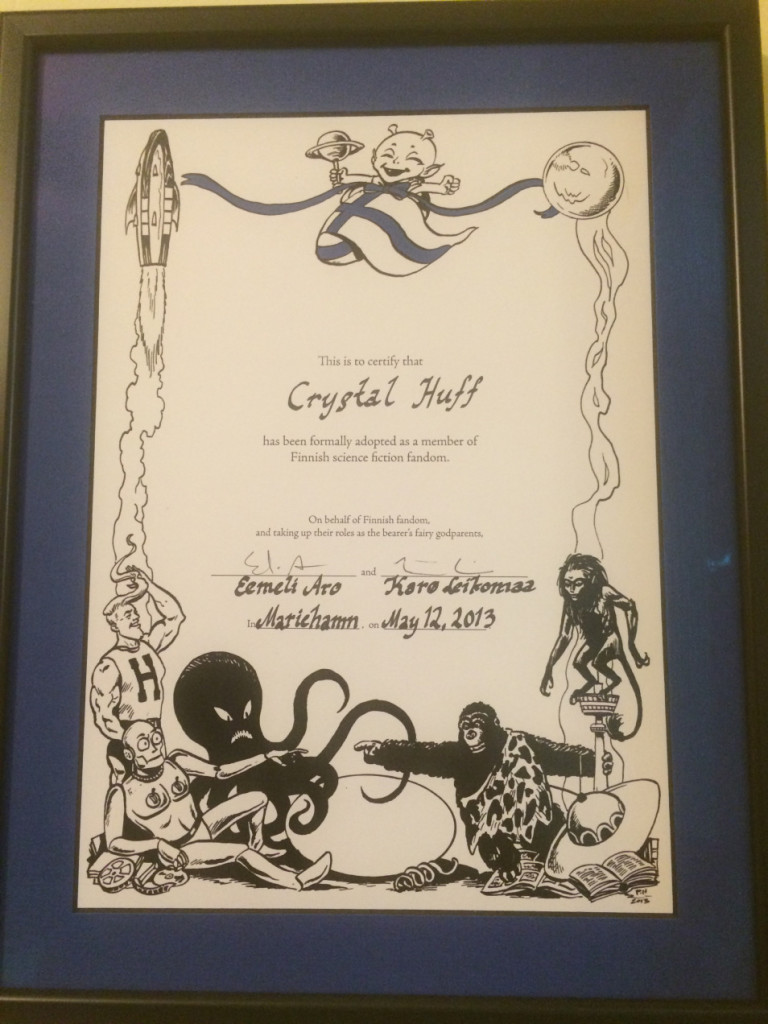(1) ROBSON ON WORLDBUILDING. Juliette Wade interviews celebrated author Kelly Robson in her latest Dive Into Worldbuilding hangout — “Kelly Robson and ‘Gods, Monsters, and the Lucky Peach’”. Wade has both notes on the interview and a video at the link.
This hangout looks twice as exciting now that Kelly has gone on to win a Nebula in the meantime (for her novellette, A Human Stain)! It was a pleasure to have her on the show to talk about her recent novella, Gods, Monsters, and the Lucky Peach.
Kelly started out by telling us about how critical economics was to this story. She’s passionate about economics! (And so she should be; worldbuilding without economics is flimsy.) She calls it “the physics of worldbuilding.” She told us that when she was first writing historical fiction, she began with medieval settings because it seemed more straightforward to manage, but that since then, she’s branched out into greater challenges. In this story, the historical portion is set in Mesopotamia!
(2) RECAP. Shannon Hale, one of the principals in the story, gives her own rundown of yesterday’s FanX antiharassment news in “My FanX craziness, annotated”.
Since this has blown up and become news, I’m going to lay out here all my interactions with FanX (Salt Lake City’s Comic Con).…
(3) IN TUNE. Olga Polomoshnova shares her analysis “On Lúthien’s power of singing” at Middle-Earth Reflections.
The fairest of all Children of Ilúvatar, Lúthien is not an ordinary character. Being the daughter of an Elf and a Maia, she inherited various traits of both kindreds. Among many of her gifts and skills singing was one of the most exceptional. However, when it comes to talking about Lúthien’s singing, we should bear in mind that hers was not renowned just for being done in a beautiful voice. Lúthien’s songs possessed special power
(4) REALITY SHOW. Tom McAllister tells new writers to recalibrate their expectations in “Who Will Buy Your Book?” at The Millions.
Before I ever published anything, I’d assumed that if I ever finished a book, there would be so much demand from family and friends alone that we’d have to go into a second printing before the release date. But I am here to tell you: most people in your family will never buy your book. Most of your friends won’t either.
I have a handful of friends and family members—people I consider close to me, people I see regularly—who have never come to any of my dozens of book events. I don’t know if they own any of my books because I haven’t asked, but I have a pretty good guess. After my first book came out, I would peruse friends’ bookshelves, trying to determine their organizational system (if it’s not alphabetical, then where is my book? Maybe they have some special hidden shelf for books they truly cherish?). On a few occasions, I called them out for not having it. This accomplished nothing, besides making both of us feel bad.
The point of this piece is not to shame those people or to complain about not getting enough support. It’s just to say: whatever you think it’s like after you publish a book, it’s actually harder than that.
(5) PAYSEUR. Quick Sip Reviews’ Charles Payseur covers “Beneath Ceaseless Skies #251”, which, coincidentally has a story by Jonathan Edelstein.
It’s a rather quick issue of Beneath Ceaseless Skies, with two stories linked in a way by their length (neither of them over 2500 words, which is unusual for the publication). But it lends both stories a sort of impact, and a feeling of anticipation. In the first, that means having to wait for the results of a very important test. In the second, that means having to wait for the results of a very important confrontation. In both, there are certain indications that might guide readers otwards guessing what happens next, but both times it’s left up in the air what _actually_ transpires after the final stories end. What it is certain is that both look at characters struggling to solve tricky problems, ones where they have been made culpable of a misstep and are desperate to find a way forward. So yeah, to the reviews!
Stories:
“The Examination Cloth” by Jonathan Edelstein (2232 words)…
(6) LAW WEST OF THE EAST RIVER. The New York Times Magazine offers the verdict of “Judge John Hodgman on Children Watching James Bond Movies”. Here’s the problem —
Ren writes: Our children, ages 7 and 9, love James Bond movies. We’ve seen almost every one, but my wife doesn’t want them to see Casino Royale. It’s often referred to as the best Bond, but she believes it is too inappropriate for them. Can you help? I’d like to watch the movie with my kids, who are James Bond fans just like me.
John Hodgman’s answer:
Of course 7-and 9-year-olds like movies with cars that fly. But they don’t love problematic gender portrayals and seventh-grade-level sex jokes. That’s why Ian Fleming wrote Chitty Chitty Bang Bang for children and the James Bond series for man-children. But if Casino Royale (which is great!) is truly the last one you have left, why not? Why not complete your experiment and cuddle up with your kids and watch Daniel Craig be tortured in a very private area? No one can stop your mad plan now. Not even you, Mr. Bond!
(7) GOLD OBIT. Virtuoso movie poster creator Bill Gold died May 20 at the age of 97. His iconic work included Casablanca and The Exorcist.
Mr. Gold comfortably spanned the years from paperboard to the computer era, and many of his posters became nearly as famous as the movies they promoted. Some won design awards; many were coveted by film buffs, sold at auctions or collected in expensively bound art books. The best originals came to be considered rare and costly classics of the genre.
For Michael Curtiz’s “Casablanca” (1942), Mr. Gold’s second assignment, he drew Humphrey Bogart in trench coat and fedora, dominant in the foreground, with a constellation of co-stars — Ingrid Bergman, Paul Henreid and others — in the airport fog behind him. To raise the drama, Mr. Gold put a pistol in Bogie’s hand. And he put fear and regret, not love, in Ms. Bergman’s eyes, to avoid stepping on his last lines.
(8) COMICS SECTON.
- Chip Hitchcock sent two Bizarro entries: (1) What we’ll dub “Jurassic Park”, and (2) another about a couple of cheerful pub vampires.
(9) SHORT STUFF. Camestros Felapton walks us through his rankings in “Hugo Ballot 2018: Short Story”.
…It doesn’t feel that long ago that the talk was whether the SF short story was dead or close to death. The impact of Sad Puppy campaigns and Rabid Puppy vandalism hit the short story category hard. And what an emblematic category it had been for the Hugo Awards and science fiction! American style science fiction had grown out of the short story style and some of the greats of SF were intimately connected with shorter form fiction. Ray Bradbury especially but also Issac Asimov – The Foundation Trilogy being one of many SF classics that grew from connected shorts.
The Hugo finalists this year are a set of entertaining and varied reads. There’s not one theme or style and there are elements of fantasy and science-fiction as well as some classic twists.
(10) KATE BAKER AT WORK. The Verge’s Andrew Liptak points to Clarkesworld where people can “Listen to one of the best short science fiction podcasts right now”.
In the years since she became the full-time narrator for the podcast, Baker has become the de facto voice for the podcast, an experience that she says is “surreal.” “I view it as a huge responsibility and an honor,” she says. “because I get to go and be in someone’s ear, and I think that’s an intimate power, and I don’t ever want to abuse that.”
Baker doesn’t read or rehearse the story before recording, and while she notes this approach has burned her a couple of times, the “biggest draw to this whole job is the fact that I’m experiencing the story along with the listener for the first time, and I can experience those emotions with the listener. If you’re hearing my voice crack or if I sound stuffy because I had to walk away because I started crying, that’s all pretty genuine.”
That’s something that shines through: a recent episode featured Rich Larson’s heartbreaking short story “Carouseling”, and you can hear her voice break after she finishes reading the story. This emoting, along with Baker’s long-standing narration for the podcast, provides a familiar and consistent warmth that subtly enhances each story that the magazine produces. The result is not only a catalog of powerful short fiction, but one that’s also presented in a voice that makes them even better.
(11) CHINESE BOTS. My brethren are bound for Luna. “China launch will prep for Moon landing”.
“The launch is a key step for China to realise its goal of being the first country to send a probe to soft-land on and rove the far side of the moon,” the state news service Xinhua quoted Zhang Lihua, the satellite project’s manager, as saying.
In addition to its onboard communications equipment, Queqiao will also carry two scientific instruments and will deploy two microsatellites.
The forthcoming Chang’e 4 mission will explore the Moon’s South Pole-Aitken Basin with a payload of scientific instruments. It is a key step in China’s long-term plan to further its ambitions as a major space power.
China previously landed a robotic lander and rover, collectively known as Chang’e 3, on the Moon in December 2014. The rover continued to transmit data until March 2015.
(12) STONY END. BBC tells about plans for “Turning carbon dioxide into rock – forever”.
With rising concentrations of atmospheric CO2, scientists have been testing “carbon capture and storage” (CCS) solutions since the 1970s.
CarbFix, however, stands out among CCS experiments because the capture of carbon is said to be permanent – and fast.
The process starts with the capture of waste CO2 from the steam, which is then dissolved into large volumes of water.
“We use a giant soda-machine”, says Dr Aradottir as she points to the gas separation station, an industrial shed that stands behind the roaring turbines.
“Essentially, what happens here is similar to the process in your kitchen, when you are making yourself some sparkling water: we add fizz to the water”.
The fizzy liquid is then piped to the injection site – otherworldly, geometric igloo-shaped structure 2km away. There it is pumped 1,000m (3,200ft) beneath the surface.
In a matter of months, chemical reactions will solidify the CO2 into rock – thus preventing it from escaping back into the atmosphere for millions of years.
(13) HOW IT BECAME A KILLER. From the BBC: “Malaria genetics: study shows how disease became deadly” — relatively recently — and a warning to watch for other parasites and viruses jumping species.
According to the World Health Organization, more than 200 million people are infected with malaria every year; the disease caused the deaths of almost half a million people globally in 2016, and the majority of those deaths were children under the age of five.
By far the deadliest species of the parasite which causes this global health scourge is Plasmodium falciparum.
While this species infects and often kills people when injected through the bite of a female Anopheles mosquito, there are many other related species which infect some of our great ape cousins – chimpanzees and gorillas.
To study those, the researchers collaborated with a team caring for injured and orphaned apes in a sanctuary in Gabon. As part of the animals’ health checks, veterinary staff take blood samples from them.
“It turns out that healthy animals have a really high background level of parasites in their blood,” Dr Berriman told BBC News. “[These animals] are blissfully ignorant of the scientific value in their blood.”
The blood samples provided a series of malarial genetic codes that the scientists could use to trace its evolutionary history.
“We don’t have fossils for tracing the history of a parasite,” said Dr Berriman.
(14) WATCHMEN PITCH. ComicsBeat is less skeptical after seeing how “Damon Lindelof details new WATCHMEN television adaptation in open letter”.
But recently, reports began to spring up that the showrunner might be taking a completely different approach to the material. Instead of a mannered, straight adaptation of the 12 issues or any kind of extrapolation thereof, he was instead comparing it to what Noah Hawley has been up to with FX’s Fargo: a series whose world is informed by the original property, but not beholden to it in terms of character or plot. In short: think of it as “stories taking place in that same world, at any time period you can think of”. It’s great, with a capital “G”.
And today, Lindelof has spoken in more specific (maybe) terms, with a letter he posted on his Instagram, to give the public an opportunity to dig into his headspace a bit regarding his overall pitch for the series…if it sounds familiar, well…it should:
More at the link.
(15) ZOMBIE EMERGENCY. Not “Florida man” this time: “Florida city apologizes for alert warning of zombies”.
Officials in a Florida city apologized for an emergency alert that warned of a real power outage and a not-so-real “zombie alert.”
The alert, sent out by the city of Lake Worth early Sunday, warned of a “power outage and zombie alert for residents of Lake Worth and Terminus,” referencing a city from AMC’s The Walking Dead.
[Thanks to JJ, John King Tarpinian, Cat Eldridge, Chip Hitchcock, Martin Morse Wooster, Carl Slaughter, and Andrew Porter for some of these stories. Title credit goes to File 770 contributing editor of the day Xtifr. Horrible copyediting courtesy of OGH.]












